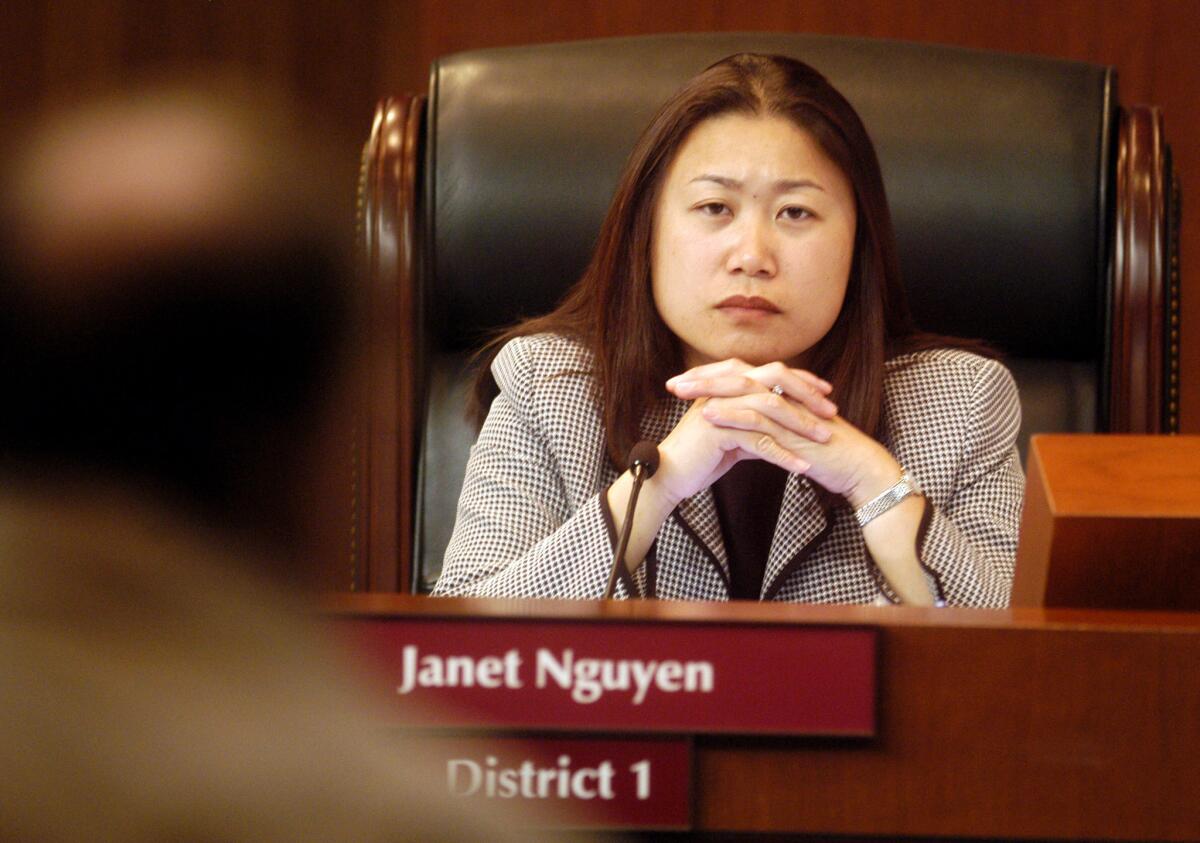Judge upholds ethics agency’s subpoenas in probe of backers of Sen. Nguyen

- Share via
Reporting from Sacramento — A Superior Court judge on Friday ruled that the state’s ethics agency could subpoena financial records as part of an investigation into possible political money laundering involving 11 supporters of newly elected state Sen. Janet Nguyen (R-Garden Grove).
Judge David A. Hoffer denied a motion by the supporters to quash the subpoenas issued by the state Fair Political Practices Commission for financial records of the contributors, according to Jay Wierenga, a spokesman for the state agency.
“The court ruled that our subpoenas are valid and enforceable and those involved are going to have to give us what we are asking for,” Wierenga said.
But the battle may not be over.
“I will have to consult with my clients, but it would be my recommendation to challenge this decision on appeal,” said James M. Crawford, an attorney for the 11 people hit with subpoenas.
The case stems from an investigation by the FPPC into whether some contributors to Nguyen’s 2012 campaign for Orange County supervisor were improperly reimbursed by others, hiding the true source of her financial backing, according to court filings.
“The evidence uncovered thus far provides sufficient grounds to support the subpoenas and shows that contributors were reimbursed for contributions to the Friends of Supervisor Janet Nguyen campaign committee,” according to a Nov. 14 court filing by FPPC Counsel Galena West.
The commission’s investigators have obtained records showing eight people illegally received reimbursements for their contributions “and during interviews conducted, six individuals have admitted to receiving reimbursements, which constitutes illegal campaign money laundering,” the state agency’s filing says.
There are no allegations that Nguyen knew any contributions to her supervisorial campaign were laundered. However, a declaration from Special Investigator Lee Myers cites “notations in Friends of Supervisor Janet Nguyen 2012 committee records that indicate possible reimbursement of contributions and intentional misrepresentation of the employer and occupation information.”
Nguyen did not return calls for comment Friday.
Crawford, who represents the 11 contributors targeted by the subpoenas, including former Westminster City Councilman Tony Lam, had filed a motion to quash the demands, arguing there was not enough evidence to support any allegations.
“The investigative subpoenas for personal and financial information must be quashed as they are overbroad, seek to unduly invade upon each witness’s privacy and fail to allege sufficient facts upon which an inference can be made of improper or unlawful campaign contributions by witnesses,” said the motion filed by Crawford.
In an interview, Crawford said his clients, who are mostly Vietnamese American, have not violated the law. The FPPC probe, according to his court filing, is based on faulty assumptions.
“The root facts upon which the FPPC finds an inference of improper donations suggest nothing more than that successive generations within a Vietnamese family commonly share a residence and that Vietnamese co-workers are sometimes politically like-minded,” Crawford wrote in the court filing.
In arguing for the court to deny the motion to quash the subpoenas, the FPPC’s attorneys said the case is a serious one for the integrity of the state’s political process.
“Making a contribution in another persons name is one of the most serious types of violations of the Political Reform Act because it denies the public of information about where a candidate receives his or her financial support in direct contrast to one of the central purposes of the Political Reform Act,” the ethics agency told the court in the filing.
It said people who violate the disclosure laws can have no reasonable expectation of privacy.
The filing lays out the evidence the FPPC enforcement staff has collected so far in the investigation, including: “a pattern of contributions from individuals with the same residential address and/or employer, a pattern of misreported residential address and occupation and employer information, and a pattern of contributions from individuals giving significant amounts but reported as “unemployed” or “student.”
In addition, similar writing and signatures were found on checks attributed to different donors, the filing said.
A declaration filed with Orange County Superior Court by Myers said he has handled several similar investigations and the evidence is similar in this case. He found contributors that were reported as unemployed were actually employed by businesses that had already contributed the maximum to Nguyen’s campaign.
“Based upon my experience, the patterns thus far evident in the current investigation of petitioners are consistent with political money laundering activity,” Myers said in the declaration. “In order to complete the investigation, it is necessary to obtain all the information requested by the subpoenas issued upon petitioners and their banks.”
More to Read
Sign up for Essential California
The most important California stories and recommendations in your inbox every morning.
You may occasionally receive promotional content from the Los Angeles Times.











